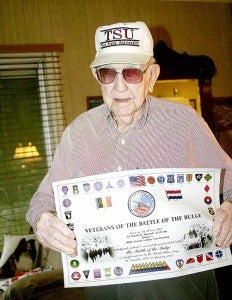Brundidge veteran remembers his role in protecting America
Published 11:00 pm Wednesday, July 3, 2013
Emmitt Boutwell shuffled through several, time-yellowed papers and separated one to the side.
“Gen. Dwight D. Eisenhower. He signed it,” he said, pointing to the signature at the bottom of the page. “We all got this letter just before the invasion of France.”
The letter was a way of letting the soldiers, sailors and airmen of the Allied Expeditionary Force know that the “eyes of the world are upon you and the hopes and prayers of liberty-loving people everywhere march with you.”
Eisenhower cautioned the fighting forces that the task would not be easy – that the enemy “will fight savagely.”
“Let us all beseech the blessing of Almighty God upon this great and noble undertaking,” he wrote.
Boutwell said there are no words to describe his feelings upon receiving that letter – fierce pride in country and a tight knot in the pit of his stomach.
Boutwell, 92, sat in his Brundidge home Wednesday and remembered what it was like to take up the fight for freedom in a land so far from home.
“It was 1942 and I was 22 years old,” he said. “I was like all the other soldiers. We understood our mission. We wanted to go over there, get it over, get back home and get on with our lives.”
Boutwell was a member of the Army Coast Artillery, which had as its mission to protect airfields and to provide protection for the 9th Army Air Force.
“We were to destroy enemy aircraft and to protect our positions,” he said. “Our mission was technical because we had to be able to identify every kind of plane even by its silhouette. We had to know the Allied planes and the enemy planes. We couldn’t make mistakes. If we did, lives would be lost.”
Boutwell served first in England, then France and Belgium.
“If we had not gone to England, that country would have been taken by the Germans,” he said.
Boutwell said, at some point, a war is won or lost. It was won for the Allies on the beaches of Normandy.
During the preparation for the invasion of France, Boutwell said there was no difference between 4 p.m. and 4 a.m.
“There was as much activity in the early morning hours as there was in the afternoon,” he said. “Everything and everybody had to be ready.”
Boutwell was not in the first waves that hit the beaches on June 6, 1944. His artillery until came later, but not so late that he was spared the horrors of the invasion.
“We went in as a convoy with nine-ton guns,” he said. “At one place, about 20 acres was covered with the bodies of American soldiers. They were there to be buried. Mattress covers from the sleep cots had been taken off and used to cover the bodies. I’ll never forget what I saw that day. But, we knew by the outcome that the war would soon be over.”
The Battle of the Bulge, December 1944 to mid-January 1945 was the most devastating battle of the war. The Americans lost 81,000 men.
Too many lives lost on both sides, said Boutwell, a veteran of that battle. “But the war was coming to an end and we would finally be going home.”
But first, Boutwell was ordered to the southern coast of France to guard prisoners of war.
“We all had enough points to go home but we didn’t have a ride,” he said, with a smile.
At long last, Boutwell’s “ride” arrived and he came home.
“I was one of the lucky ones,” he said. “But I was like most all soldiers, I took pride in serving. Nobody owed me anything. If anything was owed, I owed my country.”
A couple of years ago, Boutwell was privileged to go on an Honor Flight to Washington D.C. and have the opportunity to visit the World War II Memorial on the National Mall.
“When we were standing there, somebody asked one of the veterans what he did in the war,” Boutwell said. “He said, ‘I didn’t do much but we did a lot.’ That’s the way I feel. I didn’t do much but we did a lot.”






